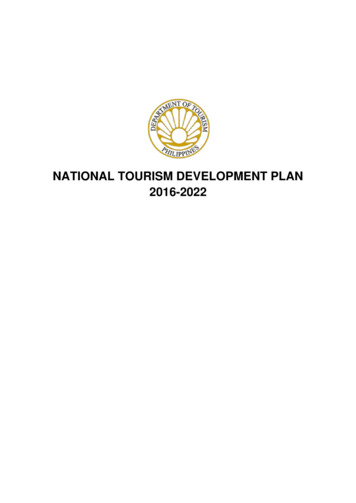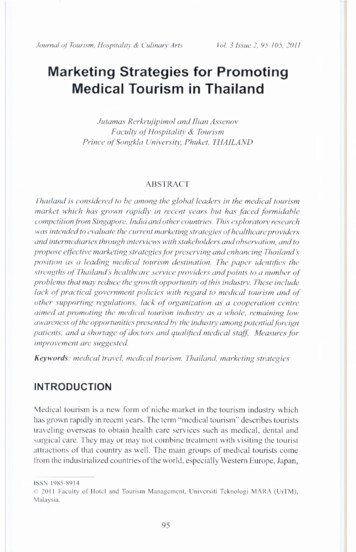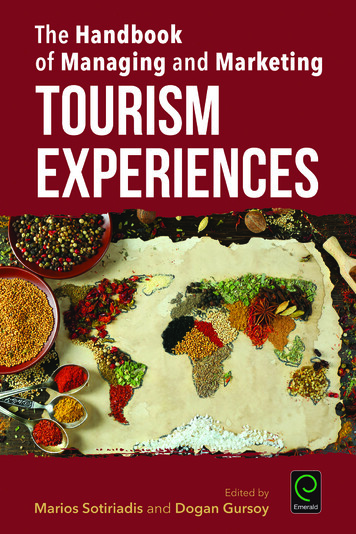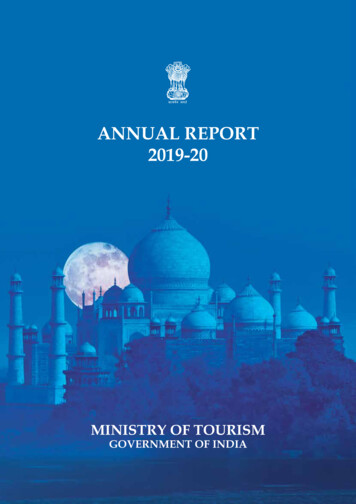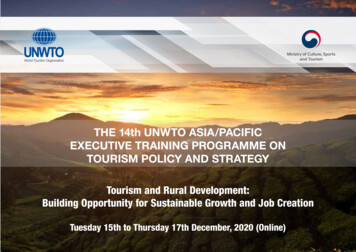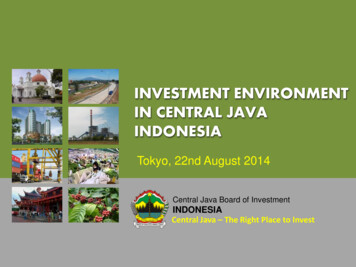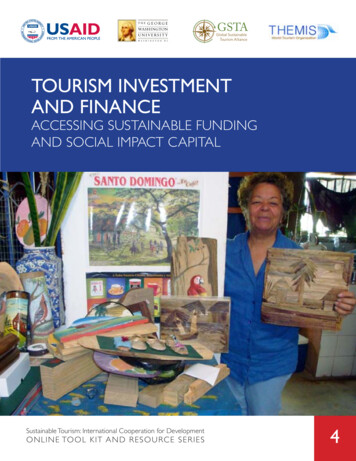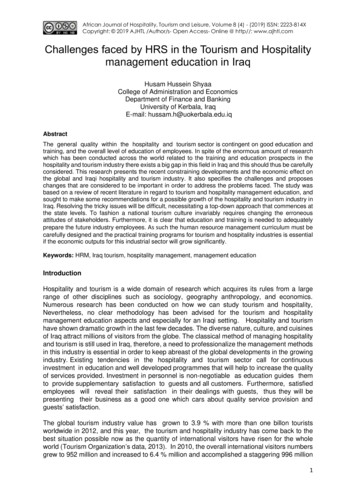
Transcription
INTRODUCTIONTOTOURISM - IICLASS - XStudent HandbookCENTRAL BOARD OF SECONDARY EDUCATIONShiksha Kendra, 2, Community Centre, Preet Vihar, Delhi-110301
Introduction To Tourism - IIStudent Handbook, Class - XPrice : 35.00First Edition : April 2016, CBSECopies : 16,000Paper used : 80 gsm CBSE Watermark White Maplitho"This book or part thereof may not be reproduced byany person or agency in any manner."Published By:The Secretary, CBSE, Central Board of SecondaryEducation, Shiksha Kendra, 2, Community Centre,Preet Vihar, Delhi-110301Design, Layout &Printed By:Pelican Press C-118, Mayapuri Industrial Area, Phase-II,New Delhi-110064
PrefaceIndia has emerged as an attractive tourism destination for all types of tourists around the yearresulting in Travel & Tourism taking its place among the key industries in the economy. It employs alarge number of workforce and its contribution to national income is also substantial. It is in thiscontext that Central Board of Secondary Education (CBSE) has launched a course on Travel andTourism.This Student Handbook "Introduction to Tourism-ll" for class X, will familiarize the students to theTourism Industry and will explain about various Tourism and Business opportunities and theimportance of Soft Skill in Tourism Industry.Academicians and Professionals from the field of Hospitality and Tourism comprised the team ofauthors for this book. The language of book has been kept as simple as possible for the benefit ofthe students. Necessary diagrams and pictorial illustrations have been included to help students tounderstand the concepts without any difficulty.The Board is grateful to the members of Committee of Course for their advice, guidance and totalcommitment towards development of this course. We are indeed indebted to these academicadvisors who have lent us the benefit of their rich and insightful experience. I would like toappreciate Vocational Education Cell, CBSE for coordinating and successfully completing thework.I hope this book will help the students and serve as a useful resource in this subject.Comments and suggestions are welcome for further improvement of the book.Chairman, CBSE
AcknowledgementsAdvisorsSh. Y.S.K. Seshu Kumar, Chairman, CBSESh. K.K. Choudhury, Controller of Examinations & Director (V.E.), CBSEContent Developed ByDr. Pawan Gupta, Chairman - PGDM (TL), IITTM, NoidaDr. Charu Sheela Yadav, Asstt. Professor, IITTM, NoidaDr. Paramita Suklabaidya, Asstt. Professor, IGNOU, New DelhiDr. Prashant Gautam, Asstt. Professor, UIHMT, Panjab University, ChandigarhMs. Aditi Chaudhary, Asstt. Professor, IITTM, NoidaEditing & CoordinationDr. Biswajit Saha, Additional Director (V.E.), CBSE
ContentsUNIT - I : SOFT SKILLSPage No.1.0 Unit Overview & Description11.1 Introduction21.2 Defining Personality21.3 Determinants of Personality31.4 Personality Development51.5 Positive Work Attitude81.6 Creating First Impression & Grooming111.7 Basic Social Etiquettes - Work and Telephone161.8 Positive Body Language201.9 Summary22UNIT - II : INTRODUCTION TO TOURISM-II2.0 Unit Overview & Description232.1 Introduction242.2 What is Tourism?252.3 General Impacts26
2.4 Typology of Tourism Impacts272.5 Sources of Tourism Information322.6 Tourism Organisations352.7 Summary39UNIT - III : TOURISM BUSINESS - II3.0 Unit Overview & Description403.1 Introduction413.2 Travel and Hospitality Terminology423.3 Activities in a Travel Agency453.4 Documentation for Travel473.5 Summary49UNIT - IV : TOURISM PRODUCTS - II4.0 Unit Overview & Description504.1 Introduction51
4.2 Classification of Tourism Products514.3 Natural Tourism Products of India584.4 Man Made Tourism Products of India594.5 Symbiotic Tourism Products of India604.6 Event based Tourism Products of India604.7 Site Based Tourism Products of India604.8 UNESCO World Heritage Sites604.9 UNESCO World Heritage Sites in India614.10 Summary62
Introduction to Tourism - IIUNIT- ISoft SkillsContents1.0 Unit Overview & Description1.1 Introduction1.2 Defining Personality1.3 Determinants of Personality1.4 Personality Development1.5 Positive Work Attitude1.6 Creating First Impression & Grooming1.7 Basic Social Etiquettes –Work and Telephone1.8 Positive Body Language1.9 Summary1.0 Unit Overview & DescriptionThis unit will further sharpen the basic soft skills learned by the students in the ninth class.This unit will help students to: Understand Concept of Personality, its determinant and how to develop personality. Understand Importance of Positive Attitude in Life. Learn the process to create first impression i.e. by understanding the importanceof Grooming. To learn about work-place Etiquettes and how to handle the Process ofTelephonic Conversation professionally. To know the required positive body language for Tourism and Travel Industry.Resource Material1.Barker, A. (2006), Improve your communication skills. New Delhi: Kogan PageIndia Pvt. Ltd.2.Bovee, Thill & Schatzman (2003), Business Communication Today, Person, New Delhi.3.Gopalaswamy, Ramesh and Ramesh, Mahadevan (2010), The Ace of Soft Skills: Attitude,Communication and Etiquette for Success. Pearson Education India.4.Klaus, Peggy (2009), The Hard Truth About Soft Skills: Soft Skills for Succeeding in a1
Hard World. Harper Collins.5.Knapp, Donna (2010), A Guide to Customer Service Skills for the Service DeskProfessionals. Cengage Learning.6.Mandal S.K. (2007), Effective Communication and Public Speaking, Jaico, Mumbai.7.Seely, John (2004), The Oxford guide to writing and speaking. New Delhi, OxfordUniversity Press.Assessment PlanExercise: Questions & Answers, Role Play and Group Discussion.1.1 IntroductionThe Introductory unit on Soft Skills for Tourism and Travel industry has highlighted theimportance of soft skills. The unit has explained in detail one of the most important soft skillsi.e. Communication. In this unit we shall study other important soft skills that will help youto earn an edge in your personal, social as well as professional life. In fact these soft skills aredirectly related to your personality and will help you to develop a personality suitable fortravel and tourism industry.1.2 Defining PersonalityBefore we start defining personality, let’s have a trip down thememory lane and remember two of your neighbourhood or oldschool friends with whom you have interacted.One is liked by everyone. She/he makes friend very quickly, smilesand greets people. Always a favourite student of teachers as well asfavourite of all relatives and neighbours. Everyone enjoys talkingto and being around him/her. The other one always complains andhas trouble keeping friends for long. She/he bosses his little siblingsat home. Always a troublemaker at school and neighbourhood. Allkids complain that she/ he picks up the fight. Even in the schoolshe/he is never able to be a part of sports team. What is the difference between the two? Thedifference is their different personalities.The concept of personality is one of the major topics of interest forsome of the top psychologist. In this unit we will define it from theview point of social attractiveness of an individual not from thescientific view point.The word ‘personality’ has its roots in Latin word ‘persona’ whichmeans a mask. In old days in order to represent qualities of atypical character of drama on stage masks were used.Personality in general terms means the unique set of qualities(i.e. physical, mental and emotional attitudes, values, interests) that2
Introduction to Tourism - IImake you different from others. Personality is actually how you present yourself to othersand how people define you. Your personality is everything about you.Oxford Dictionary defines personality as a combination of characteristics or qualities thatform an individual’s distinctive character.Here the question which tickles our mind is that what all comes under personality?Encyclopaedia Britannica describes personality includes way of thinking, feeling and behaving.Personality embraces moods, attitudes and opinions and is most clearly expressed ininteractions with other people. It includes behavioural characteristics that distinguishone person from another and that can be observed in people’s relations to the environmentand to the social group.The case of two friends discussed in the beginning of this unit alsohighlights the fact that in simple term personality means social skills.The difference in their social skills like one is friendly, collaboratorand other is domineering, troublemaker brings out the differences intheir personality. Thus personality is being used as a general label forthe amount of social skill and finesse.1.3 Determinants of PersonalityEach individual has unique personality. Have you ever think how personality is shaped?There are certain factors which shape personality of individual called determinants ofpersonality. A survey of works of different psychologist brings forward a plethora ofdeterminants of personality. Here to keep things basic we will discuss the generic determinantsof personality These are:1.1.Heredity2.Culture3.Family Background4.Our Experiences through Life and5.The People we interact withHeredityOxford dictionary describes heredity as the passing on of physical or mental characteristicsgenetically from one generation to another. We inherit certain traits, such as the colour ofour eyes, the shape of our face and body from our father, grandfather and great grandfather. Mainly these four aspects of personality we inherit i.e, body build, physical attractiveness,physical defects and health conditions from our ancestors. Most people are born with a mixtureof traits. Heredity forms your basic personality. And then the effects of our environment addto our personality development.Environment includes everything and everyone around us. Environment may help bring outcertain traits more than others. The other four determinants we will study now constitute ourenvironment.3
2.CultureCulture can be defined as the ideas, customs and social behaviour of a particular people orsociety. We learn values and inclination from our culture and it shapes our behaviour.Behaviour defines our personality. Thus people born in different cultures tend to developdifferent types of personalities. In India we can find diversity in cultural backgrounds andeach culture has some general features that highlight personality of people of that culture ingeneral. For example, people from Gujarat are more enterprising, people from Haryana aredaring and people from Bengal are creative and have great intellectual bend. Also it is notnecessary that all people belonging to a culture showcase the similar personality trait but ingeneral according to culture the dominating personality trait is found in majority of people.3.Family BackgroundFamily is the smallest unit of society. Family is a group of people related by blood or marriage.The foremost influencer after heredity to shape personality of a baby is family. Many aspectsof family like background and education of parents, socio-economic status, the number ofchildren in the family and birth order and extended members of the family such as uncles andaunts influence the shaping of personality to a considerable extent. Think once your liking –disliking, way of problem solving, way of expressing your feelings etc. All are one in otherway a reflection of what you have learned from your family.4.Experiences in LifeOne of the famous quotes by Julio Caesar - “Experience is the teacher of all things” bestexplains this determinant of personality. Your personality might have kindness as a trait butrepeated experience in your life where you felt cheated due to kindness can influence yourthis personality trait for future. Suppose three such incidents happened to you with threedifferent individuals in the past few months where you have given money but they nevercame back to you. What is the probability that you would trust another person who comesand asks you for a loan tomorrow? Rather low, one would think. Thus, certain personalitycharacteristics are moulded by frequently occurring positive or negative experiences in life.5.People We Interact With“A Person is known by the company he or she keeps” is a common proverb. We interact withan array of people in our life like – neighbours, teachers, classmates, schoolmates, friends,cousin, colleagues, boss and even strangers etc. People who are alike us in attitude and valuewe persuade them and associate with them. Even we change our behaviours to get acceptedand associated with them whom we like. For instance, we may have to become less aggressive,more cooperative to work successfully in a team etc. Thus, our personality becomes shapedthroughout our lives by at least some of the people and groups we interact with.In summary, our personality is a function of both heredity and environment (external factors)that shape it and keep it shaping.4
Introduction to Tourism - IIREVIEW QUESTIONS1. Fill in the Blanks:1.The group of traits that makes you unique is your .2.The word ‘personality’ has its roots in Latin word which means .3.In simple term personality means .4.Major determinants of personality are and .2. True and False:1.A person’s personality stays the same throughout life.2.A person’s neighbourhood has the greatest effect on his or her personality.3.Early experiences are very important to shape personality.4.Personality is natural as well as nurtured.ACTIVITY In terms of the definition of personality that is offered here in this text, write anessay about yourself. Identify what is unique about you. Finally, includein your essay as many factors in your heredity or environment as you can findthat affect your daily behaviour and thought. Once you finished the essay above, ask a friend to write a similar essay aboutyou. Once your friend has finished, compare your own essay (the answer sheet!)with that of your friend. How are they similar? How do they differ? If both you and a friend did the essay suggested above, and then comparesyour essay about yourself with a friend’s essay about him- or herself.How many parts of your essays are similar and how many are different?What factors do you both mention as influencing your personality?1.4 Personality DevelopmentThe above discussion on determinants of personality brings to light an age old debate thatwhether personality is natural or nurtured. In this regard, the central view supported byacme psychologist is that each individual is born with basic personality. To cope up with thechallenges offered by external environment individual strive to change and develop personalityin meaningful ways throughout the lifespan.Thus, personality development is a continuous and multi-faceted process which requires aset of skills that need to be learned and at times unlearned.5
The need to develop your personality in line with personal and professional requirementsunderlines the process of personality development. This is true particularly in the presenttimes where sea-change has occurred in the realm of industries, where now only technicalknowledge of doing things is not the sole criteria of selection and where wide cluster of skillsare required to cater to the changing demand of industry. In this assortment of wide clusterof skills the social attractiveness of personality is paramount important.Hence it is clear that an intelligent individual can identify the expectations of the professionhe/she wants to pursue and work on the desiredpersonality traits. This will help him/her to have awell developed conducive personality and earn acompetitive edge over others.It is more relevant in Tourism Industry where a welldeveloped personality having high socialattractiveness is more imperative and demanded thanany other skill set. The reason for same has beendiscussed in the earlier unit last year.Now the question arises how can we develop apersonality which is most suitable for tourism andtravel industry? What are the areas of our personalitywhich we should fine tune to become an asset for tourism industry?To answer this question, first we should remember that tourism is a people to people industrywhere the service provider is an integral part of the tourism product. For example: the comfortof five star hotel room like high quality bed and linen, best of antiques in room, internationalquality good food, costly furniture etc. are useless if the people serving in hotel lack professionalserving attitude, manners, communication skills and have poor hygiene sense etc. Thus,essentially we can say that to have a happy customer (tourist)at the end of the day the people serving in tourism industry shouldhave:1.Positive Attitude to work.2.Well Groomed Personality to create first impression.3.Social Etiquettes & Telephonic Etiquettes.4.Professional Body Language.Thus, eventually these above - mentioned areas turn into thekey aspects of personality which require to be developed to have a desired personality fortourism industry. In succeeding pages we will study these areas to learn how to developpersonality for tourism industry.6
Introduction to Tourism - IIREVIEW QUESTIONS1.Define Personality Development.2.Personality is natural as well as nurtured. Do you agree? Explain and giveexamples from your life experiences.3.Tourism Industry is an industry where social attractiveness of personality isvery important. Explain and give examples in support of your arguments. ?ACTIVITYRecipe for Happy Tourists & Personality Traits The Teacher should divide the whole class in small groups of five –five students.The teacher should then ask students that as a tourism service provider whatpersonality traits they think can be a recipe to make a tourist happy. Give them 10minutes to think over it. Once the students have done with their recipe then the teacher should discuss thefollowing recipe for happy tourist and also discuss the personality traits this recipehighlights.1. One smile2. Two eyes3. One voice4. One mind5. Two ears6. One firm handshake The smile gives visitors a warm welcome. Eyes establish direct contact with them.One voice and mind gives the tourist a perception of the enchanting sounds and7
picturesque scenery of the region. Two ears are essential for listening to whatthe visitors are looking for. One firm handshake wishes them a pleasant stay. Spiceit up with a well-trained staff. Bake well at summer temperatures before openingand you will have a visitor information centre to be proud of.(Source: Hospitality and Tourism Activity by New Brunswick, Department of Education.)1.5 Positive Work AttitudeAttitude is another stimulating and mystifying subject ofinterest to many researchers as well as psychologist. Attitudeand personality has a deep relationship as attitudes play amajor part in determining a person’s personality. That is whyit is important to know what attitude is, how attitude affectspersonality and how to have positive attitude at yourworkplace.Attitude as defined by Oxford Dictionary is a settled way ofthinking or feeling or evaluation (positive/ negative) about some person, object or issue.Attitude is how we look at things, events, people around us and it all starts inside our head.We can say that attitude is our mental focus on the world around us i.e. the socially significantobjects. We can focus it on whatever we want- either on good or bad, positive or negative,problem or opportunity. On what an individual chooses to focus can become a habit, habitforms our behaviour, behaviour becomes part of our psyche, then it is reflected in our activitiesand finally it becomes the core of personality. Thus, by changing our focus (i.e attitude) wecan change our personality.Power of Positive AttitudeResearchers have proved that a person who focuses on positive side of anything, be a person,event or object are happier, live longer and become successful in their life as compared to thosewho have negative attitude. The statement of the most influential American PhilosopherWilliam James further strengthens this fact. He had said that “Pessimism leads to weakness,optimism to power.”The power of positive attitude has been reinforced by a study of Harvard University alsowhich says that the main driving force to get a good job in eighty-five percent cases is attitudeand remaining fifteen percent is the technical know-how. Thus positive attitude enhancesour personality traits and lifts our personality to a more attractive level both in personal aswell as professional arena of life. Furthermore following points highlight the power of positiveattitude:8
Introduction to Tourism - II1.A positive attitude triggers our enthusiasm.2.A positive attitude enhances our creativity.3.A positive attitude makes good things happen.Positive Work AttitudeTill now we have understood that a positive attitude is a virtue for one’s personality. But to bealways positive at your workplace whether school, office or society is not very easy. Everyday we face many ups and downs especially at work place. Sometimes we feel positive andsometimes we feel negative. It becomes necessary for us to handle these ups and downspositively. How we can do this? Following strategies can help us to have a positive workattitude irrespective of any circumstances at work place:1.Examine Your Attitude Regularly: Every day one should examine his/herattitude towards work, co-workers and boss whether it’s positive or negative. Ifit’s positive do your co-workers and boss perceive it positively or not? Also if it isnegative then what are the reasons behind it? When you question yourself likethis, you will definitely find a problem, and if problem is there it must have asolution. Then try to solve this problem by adjusting you attitude or if required byeven changing your attitude from negative to positive.2.Balance Work with Personal Life: Another strategy is to have a mix of fun andwork. For this you should establish your priorities in life. Priorities mean somethingthat is more important than other things. At home family should be priority and atwork place office work should be priority .We should not think about work whenat home and also should not allow family concerns disturb our office work. Settingpriorities and meeting them successfully make our attitude more focused andpositive.3.Focus on the Positive: Always focus on your strengths and successes even ifyou are not able to be successful in all aspects of your work and in your relationshipsin the job.4.Communicate: Communication is lifeline of all relationship. When communicationstops, miscommunication begins and negativity spreads. Thus it is very importantto communicate effectively as well as listen patiently. You should be able to makeother understand what you want to say and at the same time understand properlywhat they want to communicate. Practice good listening and communication skillsevery day.5.Turn Unexpected Changes into Opportunity: Change is inevitable and change9
always bring friction. Human beings soon adapt themselves to a routine and anychange in it brings negative reactions. Example – Change of Boss or co-worker orjob profile. But one can learn to accept change and remain positive. Focus onwhat one can learn from this change and see the change as an opportunity to learnnew things and grow.6.Educate Yourself: One should be well –versed in one’s job only then one canenjoy it. One should put effort to educate oneself in all areas where improvementsare required. Even if you know your job well always try to update your knowledgeand learn new things. Be a lifelong learner. The more you learn, the more confidentyou will be.7.Maintain Your Interest: A new job means new challenges and many new thingsto learn. But with passage of time the challenges become routine affairs and youstart feeling bored and negativity increases .Thus, you should look for ways toregain the interest. Take new initiatives and invent new ideas for doing routinetasks.8.Maintain a Sense of Humour: Humour can help you to overcome tension atwork and see the lighter side of the things. Having a sense of humour does notmean joking or clowning around. Having a sense of humour means developing theability to see positive things and lessen the tension in environment. The famousquote of 34th President of U.S.A Dwight D. Eisenhower reemphasizes theimportance of humour - “A sense of humour is part of the art of leadership, ofgetting along with people, of getting things done.”9.Take Care of Your Health: There is a direct relationship between healthy habits,productivity and positive attitude. A person who has habit of exercising daily willdefinitely have good health and high productivity at workplace. Such individualwill have high positive energy and attitude towards everyone in the office. But ifyou sleep very late, do not exercise in the morning, have low level of energy atoffice definitely your productivity will be less and negative attitude will increase inyou, your boss and also co-workers. Thus poor health habits can affect your jobperformance and your attitude.10. Dress for Success: Last but not the least. How you dress and how you carryyourself reflects your attitude. In fact this is one of the most important areas ofpersonality development and also our next important topic under study. This pointis explained in later pages as a separate topic.Thus, the above mentioned ten strategies help us to maintain positive attitude and thus canmake our personality advantageous for tourism industry.10
Introduction to Tourism - IIREVIEW QUESTIONS1.Define Attitude. Describe how attitude and personality are related .Can we changeour personality by altering our attitude?2.List the ten strategies you can use to improve your attitude.3.Describe a difficult situation when you were needed to maintain a positive attitude,even though it was difficult. What strategies did you use?ACTIVITYCase Study – Torn Between Two Priorities You have been appointed as captain of the project for an interschool projectcompetition by one of the strictest teachers of your school. You with your teamare representing your school in this project competition. The final day of projectpresentation is on last Saturday of this month and you want that your schoolwins the best project title. You have to come to school on Sundays to help with aspecial project. At the same time, your family is moving to a new home. Yourfamily is counting on you to organize the move and help pack. You are exhaustedbecause of the physical and mental demands that are being placed on you. Youare torn between your need to spend time at home and your desire to show yourmettle as project leader in school competition.Case Discussion: (Moderation by teacher)1.List three options for dealing with your situation.2. List the option you would choose, and explain why you would choose it.1.6 Creating First Impression & GroomingOften you have heard the famous phrase –‘First impression is the last impression’. Have youever thought what this impression is, how it is formed, why first impression is so important11
and how one can make first impression extraordinarily? In this section we shall try to answerthese questions.According to Oxford dictionary impression is an idea, feeling or opinion about something orsomeone, especially one formed without conscious thought or on the basis of little evidence. Asthe definition highlights when we meet somebody for the first time without knowing muchabout other in totality we create an idea about him/her.Also, the first impression becomes very important because the idea which is created lastslong. In fact a study by Harvard Business School social psychologist, Amy Cuddy, says that ifin first few seconds of meeting we are able to show trustworthiness and confidence as leadingtrait of our personality then we earn a long lasting relationship. And these two traits areconveyed not on the basis of one’s intelligence or experience, rather than on basis of one’sattire and grooming level. Thus one has to work on these two aspects of one’s personalityto make first impression extraordinary.Attire / ClothingAttire means the way we dress up. As we judge books by their covers similarly we judgepeople by their clothes. Also the way we dress up show our attitude towards life. It is veryimportant to wear clothes which convey positive about us. But how can we do this especiallyin our work place?The thumb rule is that we should adapt ourselves to the dress-code of the work place. Whenwe follow the dress –code of the industry than we project an image which gel with the imageand work –culture of the work-place.In tourism industry it is very important because the way we carry ourselves convey theimage of the company as well as the quality of service. This is the reason why airline employeeswear high quality formal clothes to reassure high quality of service. Thus, at the work placewhat we wear indicates towards our professionalism. Also two types of clothing are commonin tourism industry – Business Formals (generally Monday to Thursday) and Business Casual(generally Friday). The following two images give a description of types of business formalsand business casuals prevalent in tourism industry.GroomingThe second important area which helps you to create a first good impression is grooming.The Oxford dictionary defines grooming as a noun (derived from ‘groom’) which means tohave a neat and tidy appearance. It is imperative to take care of your overall appearancewhich includes neatness and cleanliness of body and hair. It also includes how we manageaccessories which we put up with our clothes like belt, shoes, purse, watch, jewellery etc.Daily grooming is a must –must especially for work place. Your health, as well as the healthof others, depends on your practices of
2 Hard World. Harper Collins. 5. Knapp, Donna (2010), A Guide to Customer Service Skills for the Service Desk Professionals. Cengage Learning. 6. Mandal S.K. (2007 .
